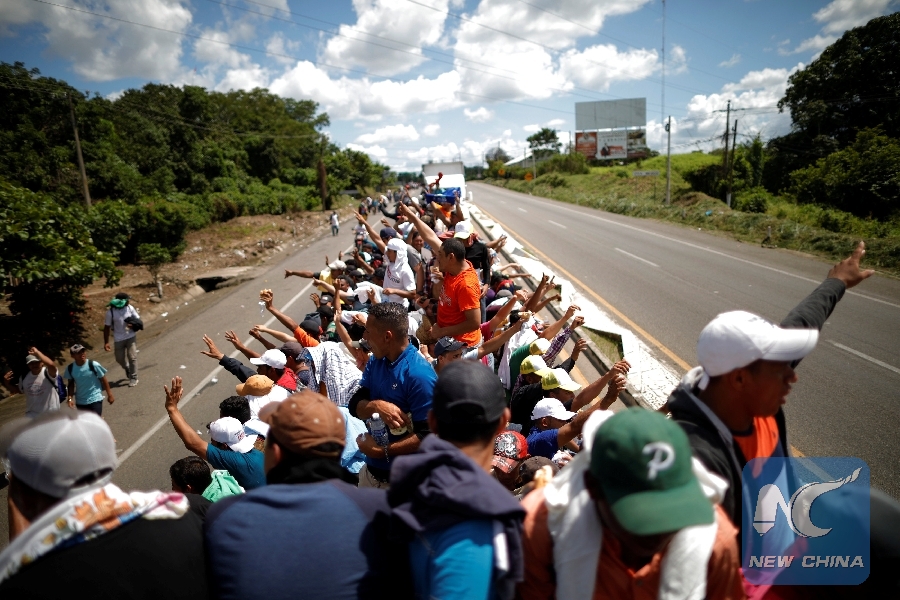
Central American migrants, who are part of a caravan of migrants trying to reach the United States, hitchhike on a truck along the highway as they continue their journey in Tapachula, Mexico Oct. 22, 2018. (Xinhua/REUTERS)
WASHINGTON, Oct. 24 (Xinhua) -- As thousands of Central Americans continued marching north through Mexico toward the U.S. border, America's relations with Mexico and Central American countries were put to the test.
On Wednesday, a mass of migrant caravan, roughly 3,600 people, were inching up the coastal highway in the southern part of Mexico, still over 1,000 miles (1,600 km) away from the U.S. border, according to U.S. media reports.
Those migrants, mostly from Honduras escaping hunger and violence, hoped to enter the United States to seek asylum, a wishful dream that has been firmly rejected by U.S. President Donald Trump, who earlier vowed to deploy troops and close the southern U.S. border to deal with the issue.
Washington has also added pressure on the Mexican government to stop the migrants from arriving at the U.S. border, either making them remain in Mexico or give up and head home.
Since Monday, U.S. Secretary of State Mike Pompeo has spoken by phone twice with his Mexican counterpart Luis Videgaray, discussing Mexico's efforts to address the migrant caravan.
"We urge timely action on their part," Pompeo told reporters later Tuesday.
For the Mexican side, while trying to persuade migrants to seek asylum in Mexico, it has not taken any forceful measure yet to confront the marching group.
Media reported that Mexican police, watching vigilantly alongside, did not disturb migrants' journey.
Some experts thought it unfruitful to push Mexico too hard on the issue.
"At a time when most immigration is coming from Central America via Mexico, not from Mexico, his (Trump's) rhetoric threatens to dampen Mexican cooperation in slowing northward migrants," Dan Mahaffee, senior vice president at the Washington-based Center for the Study of the Presidency and Congress, told Xinhua.
Apart from grilling Mexico, Trump also threw a harsh stance on Central American countries, where the migrants came from.
Earlier this week, Trump threatened to cut off or reduce U.S. aid to Guatemala, Honduras and El Salvador as the three countries failed to stop people from the exodus.
Scholars argue that Trump's "playing tough" policy may worsen the situation rather than improve it.
"It may increase the uncertainty and instability in Central America that sends migrants northward in the first place," the expert said.
"The president's attention to this issue will annoy Central American countries because of his threat to terminate funding and claim they are not doing enough to prevent mass migrations," noted Darrell West, Brookings Institution Senior Fellow.
"In addition to strong enforcement of U.S. laws, the U.S. also needs capable partners in Latin America," David Inserra, a policy analyst at the Heritage Foundation, told Xinhua.
In response to Trump's threat, El Salvador's President Salvador Sanchez Ceren expressed solidarity with the migrant caravan.
"For us to emigrate is a human right, therefore the right of these migrants must be respected," he said in a statement on Tuesday.
(Matthew Rusling from Washington also contributed to the story.)

